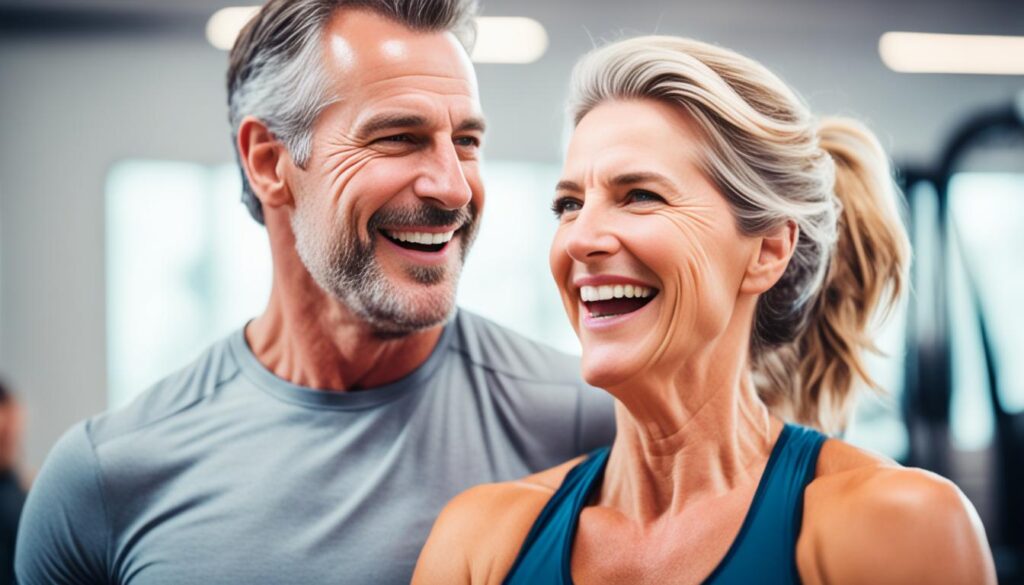Unlock Health: Advantages of Going to Gym
Hey there! I hope you’re having a great day. I wanted to share something personal with you – my journey to a healthier and happier life. A few years ago, I found myself feeling sluggish, stressed, and lacking confidence. I knew something had to change, so I made the decision to start going to the gym. And let me tell you, it’s been a game-changer.
Going to the gym has given me so many advantages in my overall well-being. Not only have I gained physical strength and improved my cardiovascular health, but my mental and emotional well-being have also soared. The positive effects of hitting the gym are truly remarkable.
But don’t just take my word for it. Let’s dive into the incredible benefits you can unlock by making exercise a priority in your life:
Exercise Controls Weight
Regular physical activity is an effective way to manage weight. Engaging in exercise helps burn calories, preventing weight gain and promoting a healthy body composition. Whether through strenuous workouts or everyday activities like taking the stairs, exercise plays a crucial role in weight management.
Exercise is a key component of a healthy lifestyle and weight management. It provides a wide range of benefits beyond just calorie burning. Regular physical activity increases metabolism, which helps in maintaining a healthy weight. Additionally, exercise helps build lean muscle mass, which in turn increases the number of calories burned at rest.
When it comes to managing weight, consistency is key. Developing a regular exercise routine and sticking to it can yield long-term results. Remember, even small amounts of exercise can make a big difference. Incorporating physical activity into your daily routine, such as walking or biking instead of driving, can help you manage your weight effectively.
The Benefits of Exercise for Weight Management
Exercise offers numerous benefits when it comes to weight management:
- Helps burn calories, aiding in weight loss or weight maintenance.
- Increases metabolism, allowing for more efficient calorie burning.
- Builds lean muscle mass, increasing the number of calories burned at rest.
- Improves body composition by reducing fat and increasing muscle mass.
- Boosts energy levels, making it easier to engage in daily activities and exercise.
- Enhances overall health and well-being.
By incorporating exercise into your daily routine, you can take control of your weight and enjoy a healthier body. Remember to consult with a healthcare professional before starting any new exercise program, especially if you have any pre-existing medical conditions or concerns.
Comparison of Different Types of Exercise for Weight Management
| Exercise Type | Calories Burned per Hour* | Intensity Level |
|---|---|---|
| Running | 580-850 | High |
| Cycling | 480-710 | Moderate |
| Swimming | 400-600 | Moderate |
| Strength Training | 240-355 | High |
| Yoga | 180-300 | Low |
*Calories burned per hour may vary based on factors such as individual body weight and exercise intensity.
As you can see from the table, different types of exercise offer varying levels of calorie burn. It’s important to choose activities that you enjoy and can sustain over time. This will increase the likelihood of sticking to your exercise routine and achieving your weight management goals.
Exercise Combats Health Conditions and Diseases
Exercise is a powerful tool in combating various health conditions and diseases. It has wide-ranging benefits for both physical and mental well-being. By incorporating regular exercise into your routine, you can improve cardiovascular health, reduce the risk of heart disease and high blood pressure, manage diabetes, and even lower the risk of depression.
Exercise for Heart Health
Engaging in physical activity, such as brisk walking, jogging, or cycling, strengthens the heart muscle and improves circulation. This helps to lower blood pressure and cholesterol levels, reducing the risk of heart disease. Regular exercise also contributes to maintaining a healthy weight, further promoting cardiovascular health.
Exercise for Mental Health
The benefits of exercise extend beyond physical well-being. Regular physical activity stimulates the release of endorphins, also known as the “feel-good” hormones. These chemicals in the brain help improve mood, reduce stress and anxiety, and boost self-confidence. Additionally, exercise can provide a sense of accomplishment and empowerment, further enhancing mental well-being.
“Exercise is the miracle cure we’ve always had, but for too long we’ve neglected to take our recommended dose. Just like taking medicine for a health condition, it’s important to prioritize exercise for its multitude of benefits.” – Dr. Margaret A. Hagerman
Furthermore, exercise has a positive impact on cognitive function. It enhances memory, attention, and overall brain health. Regular physical activity may help prevent cognitive decline and reduce the risk of age-related cognitive diseases, such as dementia.
Incorporating exercise into your daily life can have a profound impact on your overall health. Whether it’s going for a jog, attending group fitness classes, or playing a sport, finding activities that you enjoy and that get your heart rate up is key. Remember, exercise is not only a way to combat health conditions and diseases but also a way to improve your quality of life.
| Health Conditions | Benefit of Exercise |
|---|---|
| Heart disease | Reduced risk and improved cardiovascular health |
| High blood pressure | Lowers blood pressure |
| Diabetes | Enhanced management and prevention |
| Depression | Reduces the risk and improves overall mood |
Exercise is a proactive approach to maintaining optimal health and well-being. By making regular physical activity a priority, you can combat health conditions, reduce the risk of diseases, and improve your overall quality of life.
Exercise Improves Mood
When feeling down or stressed, exercise can be a game-changer. Physical activity triggers the release of brain chemicals that promote happiness, relaxation, and reduced anxiety. Additionally, exercise improves self-esteem and confidence, leading to an overall improved mood and mental well-being.
Engaging in regular exercise has been shown to have mood-enhancing benefits. Whether it’s a brisk walk, a yoga session, or a high-intensity workout, the act of moving your body stimulates the production of endorphins, often referred to as the “feel-good” chemicals. These neurotransmitters interact with receptors in the brain, triggering positive feelings and reducing the perception of pain.
But it’s not just endorphins that contribute to the mood-enhancing effects of exercise. Exercise also increases the production of other brain chemicals, such as serotonin, dopamine, and norepinephrine, which are involved in regulating mood, motivation, and stress levels. By boosting the levels of these neurotransmitters, exercise helps combat feelings of depression, anxiety, and stress.
Regular exercise can have a profound impact on mental well-being. It provides a powerful outlet for releasing pent-up tension, improving my mood, and allowing me to better cope with daily stressors. Just a few minutes of exercise can make a noticeable difference in how I feel, both emotionally and mentally.
In addition to chemical changes, exercise also offers psychological benefits that contribute to improved mood. When you engage in physical activity, you set goals, challenge yourself, and experience a sense of achievement. This can boost your self-esteem and self-confidence, leading to a more positive outlook on life.
Exercise and Mental Health
The benefits of exercise for mental well-being extend beyond a temporary mood boost. Regular physical activity has been shown to have a protective effect against mental health disorders such as depression and anxiety. Studies have found that individuals who engage in regular exercise are less likely to experience symptoms of these conditions.
Exercise has also been found to help manage existing mental health conditions. It can serve as a healthy coping mechanism, providing a distraction from negative thoughts and helping individuals regain a sense of control. Additionally, the social aspect of exercise, such as participating in group fitness classes or team sports, can enhance feelings of connection and belonging, further improving mental well-being.
So whether you’re feeling a bit down or simply looking to boost your overall mood, incorporating regular exercise into your routine can have significant mental health benefits. Take a walk, go for a swim, or join a dance class – whatever form of exercise you enjoy, it will undoubtedly contribute to a happier and healthier mind.
| Mood-enhancing Benefits of Exercise | |
|---|---|
| 1 | Increases the production of endorphins, serotonin, dopamine, and norepinephrine |
| 2 | Reduces symptoms of depression, anxiety, and stress |
| 3 | Boosts self-esteem and self-confidence |
| 4 | Serves as a healthy coping mechanism |
| 5 | Enhances feelings of connection and belonging |
Exercise Boosts Energy
Regular exercise is not only beneficial for maintaining physical health but also plays a vital role in boosting energy levels and improving vitality. When we engage in physical activity, our muscles become stronger and more efficient, enabling them to work for longer periods without fatigue. This increased muscle strength and endurance enhance the delivery of oxygen and essential nutrients to our tissues, providing them with the fuel needed to function optimally.
By improving circulation throughout the body, exercise supports the efficient transportation of oxygen and nutrients to the brain, heart, and other vital organs. This enhanced blood flow results in higher energy levels, allowing us to tackle daily tasks with greater ease and zeal.
Moreover, exercise triggers the release of endorphins, often referred to as “feel-good” hormones, which promote a sense of well-being and vitality. These endorphins not only uplift our mood but also boost our energy levels, making us feel more alert and focused throughout the day.
So, whether it’s a brisk walk, a challenging workout at the gym, or a lively dance session, incorporating regular exercise into your routine can provide a significant energy boost and help you feel more vibrant and alive.

Benefits of Exercise in Increasing Energy:
- Enhances muscle strength and endurance
- Improves circulation, delivering oxygen and nutrients to tissues
- Stimulates the release of endorphins, promoting a sense of vitality
- Boosts mood and reduces fatigue
- Supports overall physical and mental well-being
“Exercise is a key that unlocks energy and vitality, rejuvenating our body and mind.”
Exercise Promotes Better Sleep
If you struggle with sleep, exercise can be your secret weapon. Regular physical activity not only enhances your physical well-being but also plays a vital role in improving the quality of your sleep. Engaging in exercise promotes better sleep by helping you fall asleep faster and enjoy deeper, more restful sleep.
When you exercise, your body temperature increases, and your muscles work harder. This physical exertion signals to your brain that your body needs rest, making it easier for you to fall asleep at night. Additionally, exercise releases endorphins, the “feel-good” hormones, which can alleviate stress and anxiety that may be interfering with your sleep.
But remember, timing is crucial. It’s important to avoid strenuous workouts close to bedtime as they can increase your heart rate, making it difficult to relax and fall asleep. Instead, aim to exercise at least a few hours before your intended bedtime to give your body enough time to wind down.
“Exercise is a powerful sleep aid. When we exercise, we stimulate sleep-promoting brain chemicals, including serotonin, which helps regulate our sleep-wake cycle.”
A Sample Table on Sleep Improvement through Exercise
| Exercise Type | Duration | Frequency | Sleep Improvement |
|---|---|---|---|
| Cardiovascular Exercise | 30 minutes | 3-4 times per week | Shortens sleep latency and improves sleep quality |
| Yoga | 45 minutes | 2-3 times per week | Promotes relaxation, reduces insomnia symptoms |
| Strength Training | 20-30 minutes | 2-3 times per week | Improves sleep duration and sleep efficiency |
By incorporating regular exercise into your routine, you can enjoy the benefits of exercise on both your physical and mental well-being, leading to improved sleep quality and overall vitality.
Exercise Ignites Your Sex Life
Engaging in regular exercise not only improves physical appearance but can also rekindle passion in the bedroom. Physical activity boosts energy levels and enhances arousal, leading to better sexual function and intimacy.
Exercise is a natural aphrodisiac that increases blood flow to the pelvic region, making sex more enjoyable. It also stimulates the release of endorphins, known as “feel-good” hormones, which can enhance pleasure and satisfaction during sexual activity.
For women, exercise can help increase arousal and intensify orgasms. It strengthens the pelvic floor muscles, which play a crucial role in sexual function. Stronger pelvic muscles contribute to better bladder control and can even lead to more frequent and intense orgasms.
Men can also benefit from regular exercise when it comes to sexual performance. Physical activity improves cardiovascular health, reducing the risk of erectile dysfunction. It also helps maintain healthy testosterone levels, which play a vital role in sexual desire and function.
By incorporating exercise into your routine, you can ignite your sex life and experience improved sexual function and intimacy. Whether it’s strength training, cardio workouts, or yoga, finding activities that you enjoy and that get your heart pumping can lead to a more fulfilling sex life.
Incorporating exercise into your routine can reignite the passion in your relationship and strengthen the bond between partners.
Exercise for Better Intimacy
Regular physical activity not only has physical benefits but also enhances emotional connection and intimacy between partners. Exercise promotes feelings of well-being, reduces stress and anxiety, and improves body image and self-confidence, all of which can contribute to a healthier and more satisfying intimate life.
- Improved body image: Regular exercise can improve body confidence and self-esteem, leading to greater comfort and openness during intimate moments.
- Increased stamina: Exercise improves cardiovascular endurance and overall physical fitness, allowing partners to engage in longer and more fulfilling intimate experiences.
- Stress reduction: Exercise is a natural stress reliever, helping to alleviate tension and anxiety, allowing for a more relaxed and enjoyable intimate experience.
- Enhanced communication: Engaging in physical activities together can strengthen the bond between partners and improve communication skills, fostering a more intimate and connected relationship.
- Shared goals: Setting and achieving fitness goals together can create a sense of teamwork and collaboration, further enhancing intimacy and creating shared experiences.
So, whether it’s going for a romantic hike, taking a dance class, or simply taking a brisk walk together, incorporating exercise into your routine can not only improve your overall well-being but also ignite your sex life and promote a deeper sense of intimacy.
It’s time to lace up those sneakers and start reaping the benefits of exercise for a healthier, happier, and more fulfilling intimate life.
| Benefits of Exercise for Better Sexual Function and Intimacy |
|---|
| Increased energy levels |
| Enhanced arousal and pleasure |
| Improved cardiovascular health |
| Reduced risk of erectile dysfunction |
| Stronger pelvic floor muscles for women |
| Greater body confidence and self-esteem |
| Reduced stress and anxiety |
| Improved communication and connection with partner |

Exercise is Fun and Social
Exercise doesn’t have to be limited to monotonous gym sessions. It can be enjoyable and offer social opportunities. Dancing, hiking, or playing team sports are all forms of exercise that provide a chance to unwind, connect with friends and family, and have fun while staying active.
The Joy of Movement
When it comes to exercise, finding an activity that you truly enjoy can make all the difference. It could be dancing to your favorite music, playing a game of soccer with friends, or going for a scenic hike. Engaging in exercises that bring you joy not only helps you stay motivated but also allows you to appreciate the process and reap the benefits.
“I love going for group hikes every weekend. It’s not only a great way to stay fit but also an opportunity to connect with my friends and enjoy the beauty of nature together.”
Foster Social Connections
Exercise can also be a fantastic way to strengthen existing relationships or forge new ones. Joining a sports team, participating in group fitness classes, or even engaging in virtual workout challenges can provide opportunities to meet like-minded individuals who share your passion for fitness.
Studies have shown that exercising with others can boost motivation, increase the likelihood of sticking to a routine, and enhance overall well-being. So why not invite a friend or family member to join you in your favorite workout?
“I joined a local yoga class last year and not only did I find an amazing support network, but I also discovered a new love for yoga. It’s become a weekly ritual that I look forward to, both for the physical benefits and the connection with my yoga buddies.”
Stay Active and Have Fun
Remember, exercise is not a chore; it’s an opportunity to prioritize your well-being while enjoying yourself. Incorporate activities that bring you joy and allow you to connect with others. Whether it’s a game of tennis, a Zumba class, or a cycling adventure, find what excites you and keep moving!
So, the next time you lace up your sneakers or put on your workout clothes, remember to make it an enjoyable and social experience. Exercise doesn’t have to be a solitary pursuit; it can be a chance to have fun, make new friends, and enhance your overall well-being.
Exercise for Seniors: Why is it Important?
Exercise is crucial for seniors, just as it is for younger individuals. Engaging in regular physical activity offers a multitude of benefits that contribute to healthy aging and overall well-being. Here’s why exercise is so important for seniors:
Blood Pressure Management
Regular exercise helps maintain healthy blood pressure levels. By engaging in aerobic activities like walking, swimming, or cycling, seniors can reduce the risk of hypertension and cardiovascular diseases.
Disease Prevention
Physical activity plays a key role in preventing diseases commonly associated with aging, such as heart disease and diabetes. By incorporating exercise into their daily routines, seniors can lower their risk and improve their overall health.
Improved Bone Health
As we age, our bones tend to become weaker, making them more prone to fractures. Exercise, particularly weight-bearing activities like strength training or dancing, helps strengthen bones, reducing the risk of osteoporosis and improving mobility.
Mental Health Benefits
Exercise has a positive impact on mental health, reducing the risk of depression and anxiety. Physical activity releases endorphins, which enhance mood and promote overall well-being and cognitive function.
Longevity
Regular exercise is associated with increased longevity. By staying active, seniors can improve their physical fitness, maintain functional independence, and enjoy a more fulfilling and active lifestyle as they age.
Tailored Exercise Programs
Even seniors with physical limitations can benefit from tailored exercise programs. Designed to improve balance, flexibility, and strength, these programs are specifically tailored to the needs and abilities of older adults, providing a safe and effective way to stay active.
| Benefits of Exercise for Seniors |
|---|
| Manage blood pressure |
| Prevent diseases |
| Improve bone health |
| Enhance mental well-being |
| Promote longevity |
| Tailored exercise programs |
Exercise is an essential component of healthy aging. Seniors who prioritize physical activity gain numerous benefits, including improved cardiovascular health, reduced risk of diseases, stronger bones, enhanced mental well-being, and increased longevity. It’s never too late to start exercising – find a program that suits your needs and abilities and unlock the transformative benefits it offers.
Conclusion
Incorporating exercise into your life is crucial for a happier and healthier you. By following recommended guidelines, such as engaging in 150 minutes of moderate aerobic activity per week and incorporating strength training at least twice a week, you can experience the transformative benefits exercise offers for your overall well-being.
Exercise is not just a chore but an opportunity to prioritize your health. Whether it’s going for a walk, dancing, playing a sport, or hitting the gym, every form of physical activity counts. By making exercise a regular part of your routine, you can unlock a happier and more fulfilling life.
Exercise has the power to improve your mood, boost energy levels, promote better sleep, and even ignite your sex life. Additionally, regular physical activity reduces the risk of various health conditions and diseases, including heart disease, high blood pressure, diabetes, and depression.
Don’t underestimate the importance of exercise. It is the key to a healthier and more vibrant life. So, make a conscious effort to prioritize exercise and reap the benefits of regular physical activity for your overall well-being.
FAQ
What are the advantages of going to the gym?
Going to the gym offers numerous benefits for your overall well-being, including weight management, improved cardiovascular health, reduced risk of diseases like diabetes and depression, enhanced mood, increased energy levels, better sleep, and improved sexual function.
How does exercise help control weight?
Regular physical activity helps burn calories, preventing weight gain and promoting a healthy body composition. Whether through strenuous workouts or everyday activities like taking the stairs, exercise plays a crucial role in weight management.
Can exercise combat health conditions and diseases?
Yes, exercise is a powerful tool in combating various health conditions and diseases. It improves cardiovascular health, lowers the risk of heart disease and high blood pressure, manages diabetes, reduces the risk of depression, and boosts cognitive function, overall improving physical and mental well-being.
How does exercise improve mood?
When feeling down or stressed, exercise can be a game-changer. Physical activity triggers the release of brain chemicals that promote happiness, relaxation, and reduced anxiety. Additionally, exercise improves self-esteem and confidence, leading to an overall improved mood and mental well-being.
Does exercise boost energy levels?
Yes, regular exercise enhances muscle strength and endurance, which increases the delivery of oxygen and nutrients to tissues. This improved circulation leads to a boost in energy levels, making daily tasks easier to accomplish.
Can exercise promote better sleep?
Absolutely, if you struggle with sleep, exercise can help. Regular physical activity helps you fall asleep faster and enjoy deeper, more restful sleep. It is important to avoid strenuous workouts close to bedtime to ensure optimal sleep quality.
How does exercise ignite your sex life?
Engaging in regular exercise not only improves physical appearance but can also rekindle passion in the bedroom. Physical activity boosts energy levels, enhances arousal, particularly for women, and reduces the risk of erectile dysfunction in men, ultimately leading to improved sexual performance and intimacy.
Is exercise fun and social?
Yes, exercise doesn’t have to be limited to monotonous gym sessions. It can be enjoyable and offer social opportunities. Dancing, hiking, or playing team sports are all forms of exercise that provide a chance to unwind, connect with friends and family, and have fun while staying active.
Why is exercise important for seniors?
Exercise is just as important for seniors as it is for younger individuals. Regular physical activity helps maintain healthy blood pressure, reduces the risk of diseases such as heart disease and diabetes, strengthens bones, improves mental health, and promotes longevity. Even seniors with limitations can benefit from tailored exercise programs designed to improve balance, flexibility, and strength.















It's great that you talked about how business insurance can provide financial protection against unexpected events and help ensure the…
I like that you mentioned how business insurance is essential for protecting your bottom line and the long-term viability of…